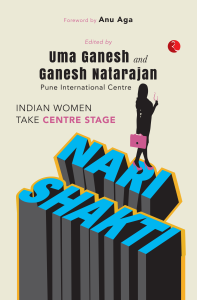Book summary by Mr. Abhay Vaidya, Director, PIC
Last year, on September 21, the Indian Parliament witnessed a rare moment of political consensus. The occasion was the passage of the very first bill in the new Parliament complex. The long-pending Women’s Reservation Bill was revived and passed successfully in the Lok Sabha and a day later in the Rajya Sabha as the Nari Shakti Vandan Adhiniyam 2023.
The 128th Constitution Amendment Bill, which became a legislation, seeks to reserve 33% seats in the Lok Sabha and state Assemblies for women. This will come into effect only after the completion of the census and the delimitation exercise and is expected to take another 5-7 years.
Notwithstanding this delay, the larger message is simple, loud and clear: As India enters her Amrith Kal—the golden period of economic growth—the time has come to empower women and empower the girl child on all fronts: in our homes; in our schools and colleges; in our offices, businesses, establishments and institutions.
Edited by our members, Dr. Uma Ganesh and Dr. Ganesh Natarajan, our latest book, Nari Shakti: Indian Women Take Centre Stage, comes with the message that “It is time to make the world more inclusive—a world where women’s voices and perspectives matter in defining products, services and policies; a world where women are no longer hoping for equal pay, career opportunities or simply a seat at the right table. It is time for women to change the game, play to win and accelerate success.”
In her Foreword, the eminent philanthropist, industry leader and founder member of PIC, Anu Aga, has pointed out that most women face four major hurdles in life. These include, an internal struggle that a girl child goes through with the messaging she receives since childhood. Then comes the bias against the girl child within the family; a similar attitude in the workplace; and finally, the absence of sufficient role models to emulate. The girl child has to face these challenges as she goes through life in an effort to realise her potential.
The book has a total of 11 chapters with contributions from a galaxy of eminent writers from within and outside PIC. Starting with Eika Chaturvedi Banerjee’s ‘In the Ancient Ruins—Gender Norms, Then and Now’, the book looks at gender roles in ancient India and across the globe. Eika says that humanity will make enormous progress if every member of our society can operate at their best capacity with their best vision.
In their chapter on ‘Women’s Empowerment—Global and National Views from Economists’, Dr. Ajit Ranade and Dr. Ejaz Ghani stress that India should proactively provide women leadership positions in political life.
Dr. Raghunath Mashelkar, Dr. Vijay Kelkar and this author (Abhay Vaidya) in their chapter on ‘Nari Shakti and Social Harmony for a Compassionate India’ emphasise that empowering women will create “a fairer and more inclusive society, allowing everyone to reach their full potential.” How we treat women reflects the overall health of our society.
‘Succeeding in a Man’s World’ is a chapter authored by Arundhati Bhattacharya, the first lady chairperson of State Bank of India in its history of 200 years. She too stresses on the need for gender equity in the private sector to empower women. She has pointed out that greater participation of women in the workplace “will not only empower women but also drive progress for all as well as economic prosperity for the nation.”
The fifth chapter in the book, ‘The Light at the End of the Tunnel: Educating a Girl Child’, is by Safeena Husain, founder, Educate Girls. This chapter highlights the importance of educating women because they will then, most likely, educate their own children. ‘Educate a girl to educate a family’ is a proven adage across societies.
Other chapters in the book include ‘Climate Resilience Through Women’s Knowledge: Towards Ethical Bio-Entrepreneurship Pathways’ (Anakika Dey and Dr. Anil K Gupta); ‘SMEs and Women’s Entrepreneurship’ (Prashant Girbane and Gujnan Bhojwani); and ‘Women for Excellence: Great Engagement Ideas from Corporate Workplaces’, (Sushma Rajagopalan).
The book gives numerous examples from the private sector in the chapter on ‘Empowering Women in Practice: Musings by Corporate and Social Leaders’ (Ganesh Natarajan, Dinanath Kholkar, Anushri Alva, Mrinal Gharpure, Priya Patil, Mridula Sankhayan and Nikki Barua).
The former MP, Vandana Chavan, Uma Ganesh and Ganesh Natarajan have written the concluding chapter, ‘Onward and Upward—Women Must Succeed’, in which they say that gender equality can be achieved and this will lead to greater equality in our society. This concluding chapter ends with the inspiring words of Swami Vivekananda, ‘Arise, awake and stop not till the goal is reached.’
Undoubtedly, the 11 essays in this book make us think and reflect on where we are and where we need to go. The book inspires us to translate our thoughts into action for the empowerment of women, especially as the centenary of our Independence is round the corner in 2047.


